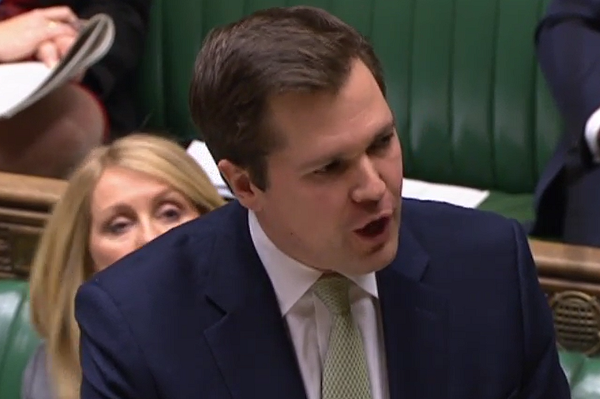You are viewing 1 of your 1 free articles
 Jules Birch
Jules BirchAfter their ‘spat’, McVey and Jenrick offered few signs of change in their first appearance in parliament
The new ministerial team is reportedly split over investment in council housing or first-time buyers, but their answers in parliament offered little sign of a serious change in any direction, writes Jules Birch
Robert Jenrick and Esther McVey faced their first parliamentary questions as housing secretary and housing minister on Monday – almost six months after they took up their posts.
The reasons for the remarkable delay to their despatch box debuts – the summer recess, Brexit and the December election – are not hard to guess and are also why housing has slipped down the political agenda in the meantime.
But, give or take the odd appearance in parliamentary debates and in front of select committees, the delay also means that we still have only a fuzzy picture of what they really think about the key issues stacking up in their in-trays.
And it came in the wake of a report in the Daily Mail over the weekend about an apparent clash between the two over where the government should spend its housing cash and which voters they should be targeting.
The “multi-millionaire” Mr Jenrick is said to want to prioritise “traditional Tory policies of helping voters onto the housing ladder”, while “blue collar” Ms McVey “has argued for money to go into more council housing to help the working-class voters who switched from Labour at the last election”.
A clash has always seemed likely given their contrasting fortunes: Ms McVey might have expected more reward for resigning as work and pensions secretary over Brexit than the reduced status of attending cabinet, while Mr Jenrick went from being her unpaid parliamentary secretary to her boss in the space of less than five years.
A Whitehall source told the Mail that “there’s no love lost there”, but the traditional “source close to Mr Jenrick” denied the story, telling the paper: “Rob and Esther have a good relationship. Rob has been clear he is very focused on homeownership and I think that’s the same for Esther.”
However, there were few signs of the clash at Monday’s questions and at times it seemed that they had swapped roles (perhaps in their eagerness to demonstrate there was nothing in it).
“Our party is tenure blind,” Ms McVey told Tory MP Eddie Hughes before completely contradicting herself by adding that “we help people along the steps to ownership, to get the house they need at the time they need it, knowing that most people want to own their own home”.
Accused by Labour’s John Healey of having “lost the argument on housing”, Mr Jenrick taunted him about the election result and claimed: “The facts speak for themselves: last year we built more homes in this country than in any other year for 30 years; we built one million homes in the last parliament and will build at least one million homes in the next parliament; more affordable homes were built under this Conservative government than under the last Labour government; and we built more council houses last year than in the 13 years of the last Labour government.”
These are the sort of ‘facts’ without context that we have become used to over the past 10 years and Ms McVey was not to be outdone.
First, she said that “under this government, council housing waiting lists have come down by nearly half a million” (failing to add that this was because it allowed councils more leeway to exclude people from the lists).
Then she claimed that “we are getting more homes built through the Right to Buy, and having sold 119,000 homes, we have built 140,000 more” (a new concoction that ignores the fact that the government has failed to meet its pledge to build one new affordable home for each additional sale after it “reinvigorated” the policy with increased discounts).
There were also some intriguing hints from Mr Jenrick about the next Affordable Homes Programme.
The Conservative manifesto committed to “renewing” it “in order to support the delivery of hundreds of thousands of affordable homes”, a form of words that could mean anything from a cut to an increase.
Mr Jenrick ramped that up by telling Tory MP Mark Pawsey: “In our manifesto, we said that we would create a successor to the Affordable Homes Programme that is at least as generous.”
Later on, asked by Labour’s Matt Western about the Mail story, he went even further, telling him that “we have already invested £9bn through our Affordable Housing Programme and made a manifesto commitment to introduce another one that is even larger” (my emphasis added).
Then he covered both bases by adding: “But do I believe that people in this country fundamentally want to own a home of their own? Yes, I do, and we will do all we can to help more people on the housing ladder.”
With the Budget and Spending Review and white papers on social housing and planning due shortly, definitive answers were few and far between in response to Monday’s questions.
“A clash has always seemed likely given their contrasting fortunes: Ms McVey might have expected more reward for resigning as work and pensions secretary over Brexit than the reduced status of attending cabinet, while Mr Jenrick went from being her unpaid parliamentary secretary to her boss in the space of less than five years”
However, there were more intriguing hints about some policies that are still up in the air.
Asked whether he would implement the recommendations of the Letwin Review on land value capture, Mr Jenrick hinted not: “As regards capturing uplifts in land value, local planning authorities already use Section 106 and the Community Infrastructure Levy to pay for crucial affordable housing and infrastructure, and, as a result of changes we have made recently, there will shortly be greater transparency so that residents can see where this money is going.”
Challenged on permitted development, he batted the question away, saying that there was a review and that he was aware of “some examples of poor practice” but adding that the controversial system had “led to a large number of net additions that would not otherwise have been brought forward”.
Asked what discussions he’d had with the Treasury about the hike in the Public Works Loan Board interest rate that councils blame for halting projects, he signalled that they should not hold their breath: “In October the Treasury made an extra £10bn of lending available, and the interest rate remains very favourable, returning only to 2018 levels.”
On leasehold reform, the housing secretary said there would be a draft bill shortly to implement pledges to ban new leasehold houses and reduce ground rent on future leases to zero.
But for existing leaseholders there was only the prospect of recommendations from the Law Commission and the Competition and Markets Authority and veteran Tory MP Peter Bottomley stressed the “need to make sure there is action, not just good intentions”.
That led directly to the plight of leaseholders in buildings with dangerous cladding who are not covered by the existing fund for high rises with Grenfell-style aluminium composite material (ACM) cladding.
Mr Jenrick said he would give this issue “careful consideration” but that was not enough for MPs who wanted action.
Labour’s Hilary Benn – organiser of an early day motion on the issue – asked him to extend the fund to blocks with high-pressure laminate (HPL) and other forms of external cladding whose residents would otherwise “face a very bleak future”.
The housing secretary gave no commitment but did appear to distance himself slightly from previous decisions:
“My predecessors chose to provide the £600m remediation fund in relation to ACM in high-rise buildings because the expert panel which advises us had said that that was the urgent challenge that needed to be addressed. We have commissioned experts from the Building Research Establishment to carry out further tests on a range of materials, including HPL. I will publish the information shortly, and will say more at that time.”
Whether that is the first sign of a climbdown – the ACM fund had to be dragged out of those predecessors after months of resistance – only time will tell.
And, with a potentially far-reaching Cabinet reshuffle on the horizon, who knows where the current ministerial duo by will be by then?
As Labour’s John Healey told Mr Jenrick: “Given the turnover of housing ministers, I trust that his first oral questions in the post will not also be his last.”
Jules Birch, award-winning columnist











